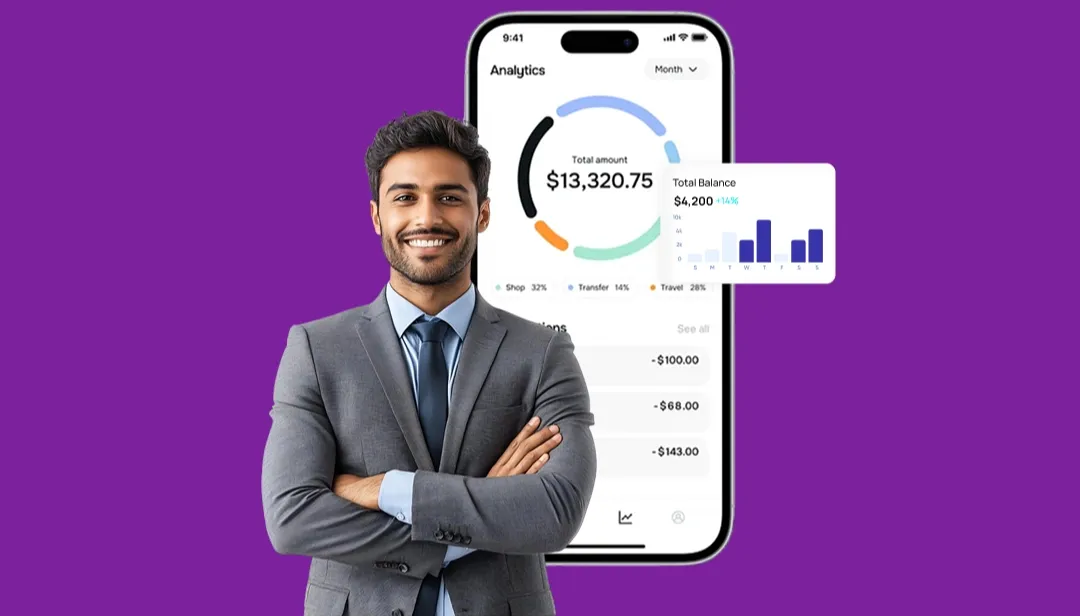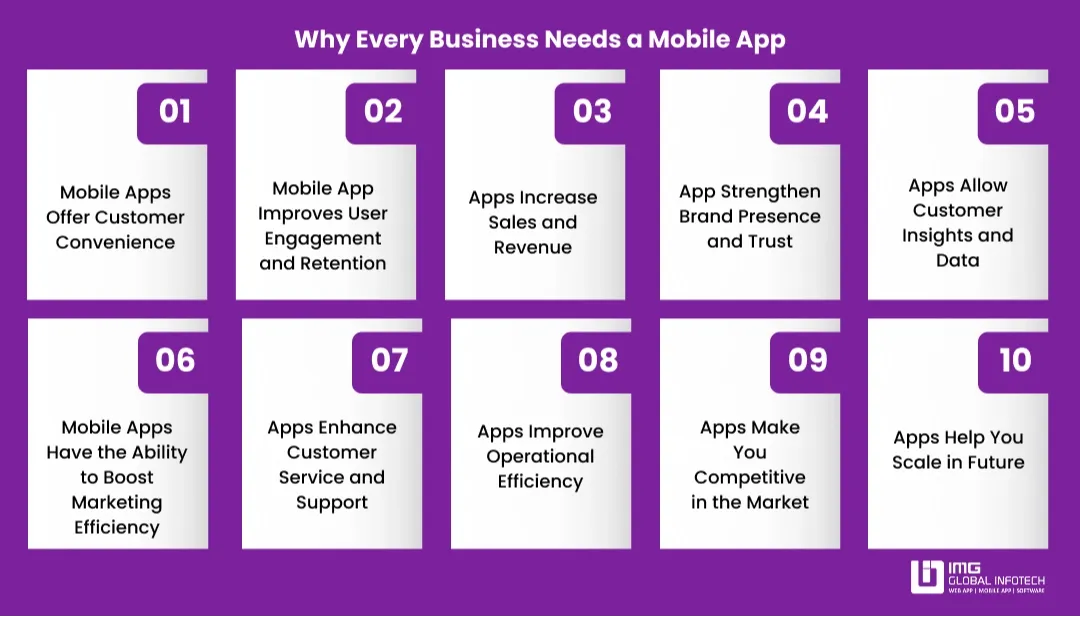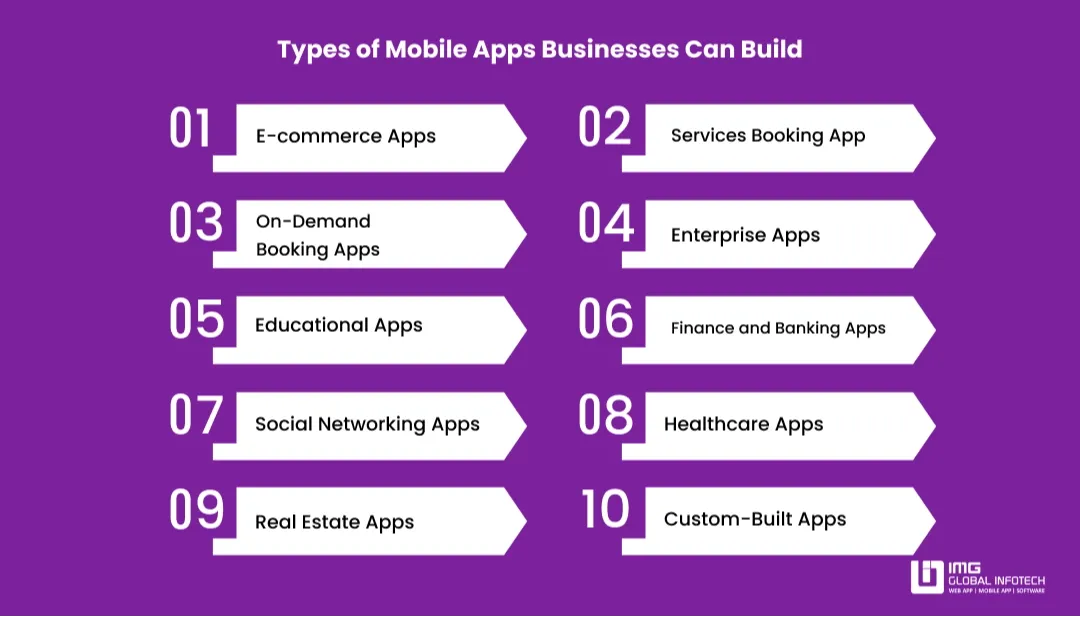10 Reasons Why Every Business Needs A Mobile App In 2026
Neeraj Rajput
Nov 25, 2025

Today is the era of modernization, and tomorrow is the modernization universe. It is trending and changing at an extremely fast pace, and now is the moment for a mobile application. You can do everything at the click of a few buttons on your phone today. If you want to place an order for food, there is an app for that. If you want to book a ticket, there is an app for that, too. Are you calling a car washer? I am sure there is an app for that, too! The whole world has come in just one mobile phone, and the mobile app development company is eyeing this opportunity. Customer expectations are evolving, shifting buying behaviours, and organizations are pursuing a mobile-first ecosystem. Mobile applications are no longer a luxury, but a requirement by 2026. It is crucial to drive growth, customer engagement, and brand visibility.
Today, customers shop, browse, research, and connect using their mobile devices. More and more usage of smartphones means businesses have to rethink how they can interact with their consumers. A good mobile app gives you direct access to your consumers’ screens and can offer personalization and speed. It provides convenience, comfort and seamless communication to the users. An important point to note is: the digital economy is expected to grow exponentially by 2026. And that is why many companies are actively involved in mobile app development services. It ensures relevance, competitiveness, and future-proofing for the businesses.
Why Every Business Needs a Mobile App in 2026?
Nowadays, most people have their personal mobile phone, and the usage has increased manyfold. Even in less developed countries with Tier-2 or Tier-3 cities, the use of smartphones, internet connectivity, and AI-driven user experiences, mobile apps are shaping the businesses’ future. The companies nowadays use mobile apps as a tool to boost customer satisfaction, engagement, increase sales, and streamline operations. It is also helpful in branding enhancement and creating new digital revenue streams.
A good mobile app with features is your business’s personalized digital touchpoint. It helps simplify complex workflows, improves customer support, and brings your entire ecosystem into your pockets. If you are a startup that wants to scale or an offline business that wants to expand, choosing the right mobile app development company helps you build scalability, provide security, and offer a user-friendly digital experience.
List of 10 Reasons Why Every Business Needs a Mobile App in 2026

Let us now see the reasons why every business needs a mobile app in 2026
Mobile Apps Offer Customer Convenience
The mobile app for small businesses and for big enterprises ecosystem is growing because it provides customer convenience, which is an important aspect. People expect quick access to services, products, and information. Nowadays, people do not wait for much longer and look for the apps that give them service at speed, on their convenience.
Apps load faster compared to websites, and store user data locally. They also support offline access and reduce friction, enabling customers to get what they want quickly. Features like one-click ordering, push notifications, and aved preferences elevate digital experience drastically.
Mobile App Improves User Engagement and Retention
Mobile apps are useful for engagement. With good design, a user engages with the app more compared with the website. With a user engaging more, the chances of retention are also higher. And more retention means more revenue, which is the end goal of every business. A mobile app boosts engagement using personalized notifications, gamification, loyalty programs, AI-driven recommendations, in-app messaging, and UX-optimized journeys. The mobile app gives control over how, when, and where you interact with your customers. Businesses that understand the benefits of mobile apps for business use apps to create deeper, more meaningful user relationships.
Apps Increase Sales and Revenue
Customers love buying things, and a mobile app makes it easier for them with faster and more personalized services. The app-based sales are also expected to boom and leave traditional websites behind by a huge margin in 2026. An app creates revenue opportunities through in-app purchases, cross-selling and upselling, subscription models, personalized offers, and loyalty programs. An app is the most profitable channel for retailers. For service businesses, the app serves as the fastest way to acquire leads and make appointments. For B2B businesses, the app simplifies client and repeat business interactions.
App Strengthen Brand Presence and Trust
A mobile app for businesses is a strong way to build credibility and image. It helps them to strengthen their brand presence and trust in customers’ minds. The app helps in delivering more professional user experiences. Some of the features that strengthen branding include smooth UI/UX design, personalized interfaces, brand-themed design, app-exclusive offers, and customer loyalty programs. If your app appears consistently across touchpoints, more trust will be built in customers. Mobile apps will help you achieve this point.
Apps Allow Customer Insights and Data
A major advantage that a mobile application offers to businesses is the ability to collect and analyze data in real-time. Businesses can monitor consumer purchase behaviour, browsing habits, time-on-feature, demographics, and feedback/usage analytics. When businesses have analyzed the data, they can make informed choices and, as a result, offer personalized recommendations, targeted campaigns, and improved product offerings.
Due to this valuable ability of a mobile app, businesses prefer custom mobile app development. They can tailor insights as per their needs and aim.
Mobile Apps Have the Ability to Boost Marketing Efficiency
The mobile apps communicate directly with customers, eliminating the need for heavy spending on ads. It acts as an always-on marketing channel, allowing you to send personalized messages, launch offers, and promote new arrivals. Some of the marketing benefits include push notifications, in-app promotions, segmented messaging, and automated journeys.
The mobile apps are more effective compared to social media and email marketing when it comes to higher visibility and click-through rate. It also brings consistent results by building a strong mobile-first marketing funnel.
Apps Enhance Customer Service and Support
Customer service is one of the most important aspects of any business’s success. A well-structured app helps in faster, smarter, and efficient support. By integrating AI chatbots, help centres, FAQs section, ticketing system and real-time support, a seamless customer support and services can be achieved. To achieve smooth internal and external communication, many organizations are going for enterprise mobile app development.
Consumers do not have to keep an eye on emails or look for call centres. Whatever they want is easily accessible in the app. Overall, it helps in reducing operational load on support staff and improves customer satisfaction.
Apps Improve Operational Efficiency
Through mobile apps, an employee can check their work history, keep a check on their allowances, and see their earning dashboard. At the same time, the company can track inventory and sales reports to check if everything is alright or if there is a need for changes. The mobile apps are not just for consumers, but they are also helpful for businesses to check employee management, task automation, logistics handling, and coordination with team members. All these features in the apps help in higher productivity, fewer errors, and smooth operation. Workflow automation will be the new normal by 2026.
Apps Make You Competitive in the Market
These mobile app trends 2026 are something where personalisation, AI, and automation are taking charge and redefining app experiences. Nowadays, customers prefer using modern technology, and if your business is still not using a mobile app and relying on old tactics, you are bound to lose the fight in this highly competitive market. A good and well-designed app will help you stand out against the competitors, deliver smoother experiences, and stay relevant in the market. It also meets customers' modern expectations and provides app-exclusive benefits. If you are a retailer, service provider, or in the healthcare sector, having a mobile app is a necessity for your business.
Apps Help You Scale in Future
Today’s situation of digital transformation explains the increasing popularity of business mobile app development company across industries. Investing in mobile apps today will help the businesses grow in future. The mobile apps help in preparing for AI-driven automation, smart notifications, voice-based interactions and wearable integration. It also helps in AR or VR experiences, predictive analytics, and hyper-personalization. Having an app for a business means they are technologically upgraded, and there is a possibility of scalability in the years to come.
The mobile app for ecommerce business sector is booming worldwide, and there is an estimation that it will dominate the retail space in 2026. Businesses that operate online stores can check faster checkouts, mobile-first shopping and personalized product feeds through the mobile app.
Types of Mobile Apps Businesses Can Build in 2026

Developing a mobile app for business requires planning, determining goals, industry knowledge, and knowing your target audience. Here are some of the top categories brands can develop.
E-commerce Apps
E-commerce apps are growing at a rapid pace. Businesses that sell products online, like cosmetics, clothes, furniture, etc, building an e-commerce app will help them stay relevant in the market. Other examples are marketplaces and D2C brands.
Services Booking App
People love to see the services being done at their doorsteps. There are numerous apps available in the market for salons, repair services, fitness trainers, consultants, etc, where an expert from the industry comes to your place and provides services.
On-Demand Booking Apps
On-demand apps are needed for food delivery, ride-hailing, cleaners, healthcare medicines and more. The demand for these apps has grown over the years, and the businesses are investing heavily in them.
Enterprise Apps
Enterprise apps are important for internal team management, workflows, and HR. It helps in the smooth functioning of day-to-day operations and reduces friction.
Educational Apps
Ever since the pandemic, the need for eLearning apps has gone up. It is helpful in exam preparation, tutoring, and skill development. A student can also learn on their own convenience and speed.
Finance and Banking Apps
The finance and Banking app market is a much-needed one, with the modernization in digital payments. It is also helpful in budgeting, insurance and investment platforms for the banks.
Social Networking Apps
Probably the most important app market across the globe. People nowadays spend a lot of time on social networking apps, and interact with friends, families and even make random friends. These apps are also a source of entertainment for the users. It helps in user engagement and building communities.
Healthcare Apps
The healthcare and medicine app industry is ever-changing and is expected to take a good amount of market share in the near future. People can now book a doctor’s appointment, consult them online and then order medicines. The medicines will be delivered at their doorsteps, even within a few minutes in emergency cases. These apps also keep digital records and track the health situation of a customer.
Real Estate Apps
Real Estate or property market share is quite huge. The need for a real estate app or property-based app can be felt by anyone who is in this space. With the use of an app, a buyer can search for property locations, see it live through the AR or VR technology, and interact with the agent for further processing.
Custom-Built Apps
Custom-built apps are designed especially to match your business processes and goals. A business can ask the mobile app developers for a specific or customized feature to make things easier for them.
How Much Does It Cost to Build a Mobile App for Your Business?
The cost of a mobile app development depends on a number of factors. It varies depending on the complexity of features, platform choice, UI/UX requirements, backend integrations, technology stack, and development hours. It also depends on the location of the development team and the level of the app. Let us now break down the mobile app development cost.
Simple or Basic Level App
The basic level app is a good choice for a startup that wants an MVP. It reduces their cost, and they will get all the basic features like user registration, reviews and ratings, customer support, and more to start the venture. It is also suitable for small businesses with a smaller budget. The cost of a basic-level app building could range from $5,000 to $8,000.
Intermediate or Mid-Level App
The mid-level app development can cost you around $10,000 to $15,000. It is a good choice for the enterprises that want to expand. They will get features like push notifications, advanced search and filters, in-app chat or messaging, or multiple payment gateways.
Advanced Level App
An advanced app is suitable for enterprises that operate with full automation. The app includes modern features like recommendations, specific search filters, API integration, AR or VR technology and more. It is a one-time huge investment, but a worthy one as it helps in scaling, growth, and sustainability in this ever-changing market. The cost of building an advanced app can range beyond $15,000.
One thing from the above point is clear that the more features, the more the development cost. Choose the right mobile app development company that helps you in long-term support, which eventually leads to good Return on Investment (ROI).
Cost breakdown
Choosing the Right Mobile App Development Company
Hiring a mobile app development company requires planning, exploring, and knowing your goals. One bad decision could lead to failure in business. Before partnering with the development company, consider these things.
Expertise and Portfolio
Before hiring, check the company’s previous works and projects. See the previous apps they have built and in which sector. Also, check what kind of technology they have used to develop those apps.
Tech Stack
Make sure that the company works with modern technology and tools like Flutter, React Native, Kotlin, and Swift. Having an app built from old tech is not worth it at all in today’s time.
UI/UX Design
Check the templates the company has used to develop a design. A good design appeals to the user and keeps them engaged more with the app. It is important for customer retention.
Communication and Project Management
Look for regular updates and communication with the company. Ensure that there will be transparency and that the workflow will be clear.
Customization
Simple templates do not provide many important features. There is a limitation in the simple and basic templates. That is why you always look for a company that provides tailored solutions, not generic templates.
Post Launch Support
The development company’s work does not end with just launching an app. They also provide regular updates, long-term maintenance, and support. It helps in stability, sustainability, and growth opportunities.
Security Standards
A company that provides data protection, encryption, and secure APIs should be your top priority. The security standards of a developing company must be top-notch.
Choosing the right app development company will help you get future-ready. It also drives revenue, customer satisfaction, customer retention, and seamless operations.
Conclusion
Mobile apps are a foundation for businesses to engage with customers, automate, and digital revenue. It is high time for businesses, startups or enterprises to invest in mobile app technology. It helps you scale faster, connect better, and grow smarter. The ability to create mobile applications gives the business owner an opportunity to create a consistent experience for their brand, create unique customer experiences, create deeper personalization, utilize automation tools and artificial intelligence, utilize predictive analytics to determine future behaviours and increase productivity by streamlining workflows. By partnering with a qualified mobile app development services team, businesses will be able to compete in an ever-evolving environment and provide their customers with superior customer satisfaction through the delivery of exceptional products and services.
-
 How to Build a Jewelry E-commerce Website Like CaratLane?
How to Build a Jewelry E-commerce Website Like CaratLane?
-
 Porter-Like Logistics App Development Cost in 2026
Porter-Like Logistics App Development Cost in 2026
-
 Top AI Features Every Successful Astrology App Must Have
Top AI Features Every Successful Astrology App Must Have
-
 What Are the Top Ecommerce Development Trends to Watch in 2026?
What Are the Top Ecommerce Development Trends to Watch in 2026?
-
 How Much Does AI Astrology App Development Cost in 2026?
How Much Does AI Astrology App Development Cost in 2026?
-
 How to Choose the Right AI Consulting Company in the USA?
How to Choose the Right AI Consulting Company in the USA?
Neeraj Rajput is the co-founder of a leading IT company with over a decade of experience in technology consulting, product development, and digital transformation. With a passion for solving complex business challenges through smart tech solutions, he shares insights on innovation, leadership, and the evolving IT landscape












